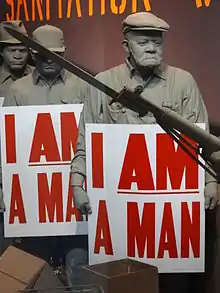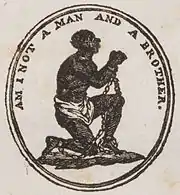I Am a Man!
I Am a Man is a declaration of civil rights, often used as a personal statement and as a declaration of independence against oppression.

"Am I not a man?"

Historically, in countries such as the United States and South Africa, the term "boy" was used as a pejorative racist insult towards men of color and slaves, indicating their subservient social status of being less than men.[1] In response, "Am I not a man and a brother?" became a catchphrase used by British and American abolitionists. In 1787, Josiah Wedgwood designed the Wedgwood anti-slavery medallion. He copied the original design from the Society for Effecting the Abolition of the Slave Trade as a cameo in black and white. It was widely reproduced and became a popular fashion statement promoting justice, humanity, and freedom.[2]
The question "Am I not a man?" was brought up again during the Dred Scott decision of the U.S. Supreme Court in 1857.[3] During the Civil Rights Movement at the Memphis sanitation strike in 1968, "I Am a Man!" signs were used to answer the same question.[4] On trial for bringing his son back to Nebraska for burial, from a forced march to Oklahoma, in 1879 Ponca Chief Standing Bear spoke to Judge Dundy in his Omaha trial, "That hand is not the color of yours, but if I pierce it, I shall feel pain. If you pierce your hand, you also feel pain. The blood that will flow from mine will be the same color as yours. I am a man. God made us both." Standing Bear (and Native Americans) were granted habeas corpus meaning that they had status in the court and were indeed human beings.[5]
Modern use
"I Am a Man!" has been used as a title for books, plays, and in music[6] and film[7] to assert the rights of all people to be treated with dignity.
"I Am a Man!" was a foundational reference in Derek DelGaudio's theater show "In & Of Itself." DelGaudio created 1,000 "I AM" cards, each with a different descriptor. Before each show, audience members were instructed, "Choose how you wish to be seen."[8]
"I am a man" is one of the many pre-approved social justice messages the NBA allowed their players to display on the back of their jersey during the remainder of the 2019-2020 NBA season. Additional messages include: "Black Lives Matter; Say Their Names; Vote; I Can't Breathe; Justice; Peace; Equality; Freedom; Enough; Power to the People; Justice Now; Say Her Name; Sí Se Puede (Yes We Can); Liberation; See Us; Hear Us; Respect Us; Love Us; Listen; Listen to Us; Stand Up; Ally; Anti-Racist; Speak Up; How Many More; Group Economics; Education Reform; and Mentor" according to the NBAPA.[9]
Untitled (I Am a Man),1988 painting by Glenn Ligon as a reinterpretation of the signs carried during the Memphis sanitation strike in 1968.
Other uses
- The Elephant Man declares, "I am not an elephant! I am not an animal! I am a human being! I ... am ... a ... man!"
References
- Andersen, Margaret L. (2008). Sociology With Infotrac: Understanding a Diverse Society. Thompson Learning. p. 61. ISBN 9780495007425.
- Dabydeen, David (February 17, 2011). "The Black Figure in 18th-century Art". BBC News. Retrieved December 18, 2012.
- Am I Not a Man? by Mark L. Shurtleff. Reviewed by Robert Fleming. AALBC.
- "Memphis sanitation strike photo". teaching tolerance. 9 July 2014. Retrieved 9 July 2020.
- "I Am a Man": Chief Standing Bear's Journey for Justice, Joe Starita 2010.
- Ron Miles, "Ron Miles: I Am A Man", All About Jazz, October 27, 2017.
- Marc Myers, "Mining the Memphis Sound", The Wall Street Journal, June 17, 2011.
- Costa, Mike (2016-07-20). "Derek DelGaudio Is Turning Magic into an L.A. Phenomenon". Los Angeles Magazine. Retrieved 2019-09-23.
- "Full list of the messages NBA players will wear on their jerseys as season restarts". USA Today.
- Chief Standing Bear https://www.nps.gov/mnrr/learn/historyculture/standingbear.htm/